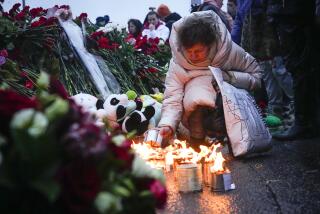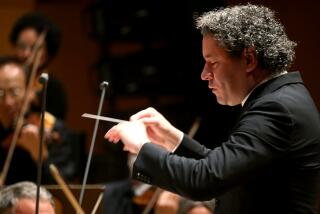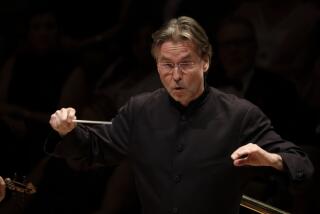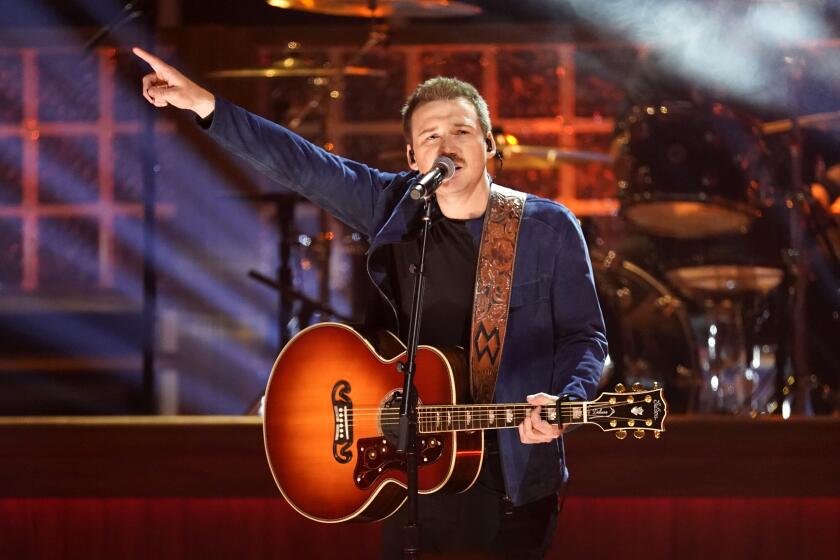Newly weighty matters at L.A. Philharmonic TchaikovskyFest
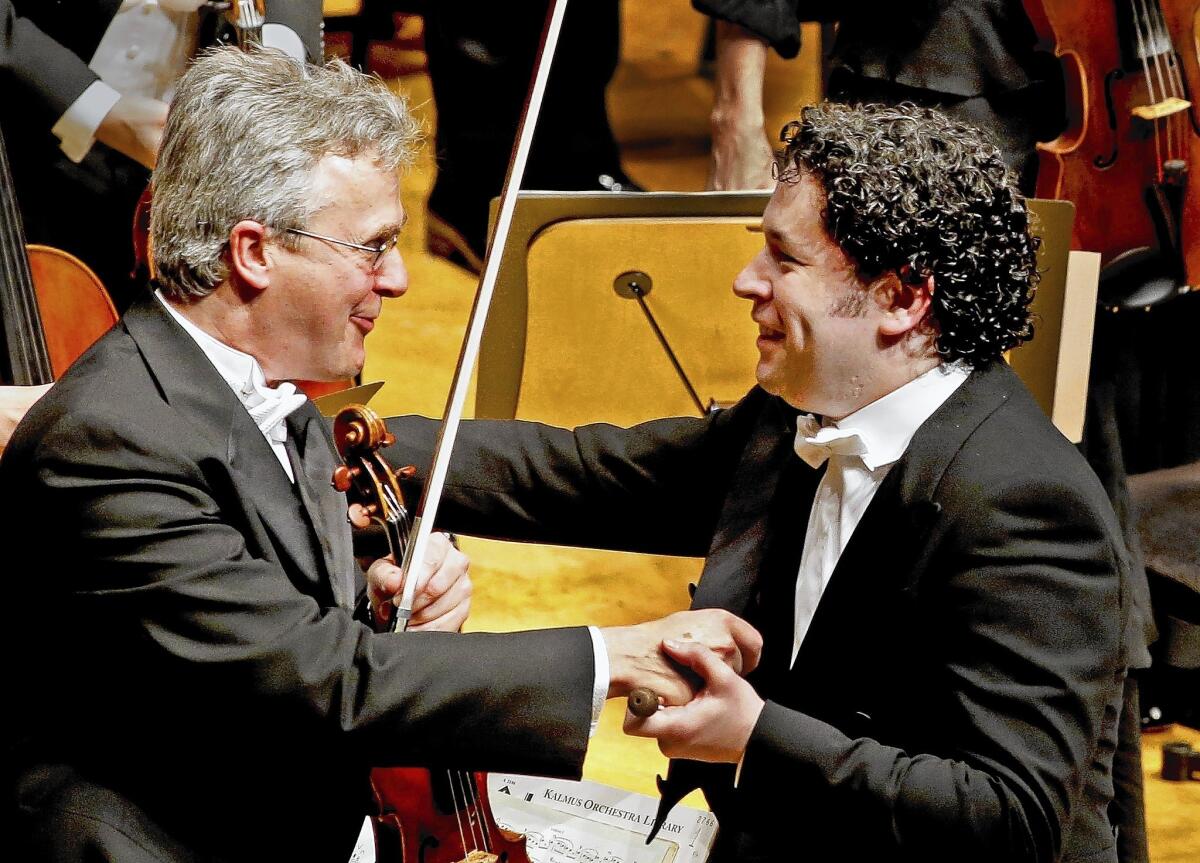
The Los Angeles Philharmonic TchaikovskyFest — 15 all-Tchaikovsky concerts in 11 days featuring the L.A. Philharmonic, the Simón Bolívar Symphony Orchestra of Venezuela and YOLA (Youth Orchestra of Los Angeles) — ended with a sensational performance of the “1812 Overture.”
A humongous orchestra made up of 159 members of the L.A. Phil and Bolívars playing side by side crowded the Walt Disney Concert Hall stage Sunday. Every note sounded rapt.
For the famous celebratory finish, bells pealed gloriously; timpani and bass drums were whacked as though they needed their living daylights beaten out of them and trumpets stationed in the organ loft blazed in golden sonic glory. The organ’s bass notes seductively vibrated the concert hall floor and seemingly aroused the full orchestra into new heights of thrilling radiance.
PHOTOS: Best classical concerts of 2013 | Mark Swed
This, however, is empty music. Tchaikovsky had to have his arm twisted to write it for an elaborate celebration of Tsar Alexander II’s reign and the consecration of the Cathedral of Christ the Savior in Moscow. He put the project off until the last minute. Finally finding inspiration in the Russian defeat of Napoleon’s army 68 years earlier, he tossed off a 15-minute “Festive Overture” in a week. Tchaikovsky’s critics dismissed the work as patriotic posh. The composer expected no less; he felt the same. But the crowd apparently loved it and it has become his most popular work.
By empty music, I don’t just mean that there is little of substance to the piece, but that Tchaikovsky didn’t have a specific narrative to tell in music other than to raise nationalist Russian spirits. Adding a little context to Sunday’s performance would have been asking for trouble. Napoleon justified invading Russia to ward off Russia’s designs on Poland and France. Sunday, of course, was the day the Russians were mobilizing troops in the Crimea.
What is appropriate politically motivated music for Moscow’s central Cathedral also happens to be a cause of current international concern. This is where members of Pussy Riot were arrested.
For Venezuelans, the “1812” serves as a contagiously rousing piece to get kids excited about orchestral music. Children in colossal-sized Venezuelan youth orchestras sponsored by the national El Sistema music education program enthusiastically play the overture from memory. The Bolívars, now professionals mostly in their 20s and inspirational examples of the way music can change lives, are all “1812” veterans.
PHOTOS: Faces to watch 2014 | Classical music
Their pride as musicians who can share the stage with the L.A. Phil and as Venezuelans on Sunday was palpable. The Bolívars are uniquely physical orchestral musicians, grooving as they play like pop musicians. They tone it down somewhat when sitting with the more proper Angelenos, but here, they got more than usual movement from the L.A. Phil.
Can we, through works like the “1812,” escape history? Of course not. But we can rise above it.
Planning for the TchaikovskyFest took place more than a year ago. Having done a project of conducting Mahler’s nine symphonies with the L.A. Phil and the Bolívars two years ago, music director Gustavo Dudamel followed up with Tchaikovsky’s six, along with some miscellaneous other orchestral music by the Russian composer.
He also wanted to pay tribute to his Tchaikovsky-loving mentor José Antonio Abreu, the founder of El Sistema, who turns 75 this year. Thanks to Abreu, Dudamel and literally millions of other Venezuelans (there are more than 500,000 students currently in El Sistema) have grown up on Tchaikovsky. It was with the Fifth Symphony that Dudamel made his U.S. debut in 2005.
There was another unspoken factor. In his engagingly provocative Upbeat Live pre-concert talks last week, the author Joseph Horowitz reminded us that the composer, while always an audience favorite, has only recently begun to be taken seriously by music historians. And part of what has made Tchaikovsky now a subject of great fascination is the speculation of just how much his music reveals his personal narrative.
CRITICS’ PICKS: What to watch, where to go, what to eat
Horowitz insisted that these scores tell a story, although he also insisted it needn’t be Tchaikovsky’s. It could be your own. In the Fifth Symphony, for instance, he pointed out that Leonard Bernstein’s reading of the work — in which a despairing opening theme ultimately becomes one of sunny triumph — represents Tchaikovsky’s coming out of the closet. There is no evidence to support that other than the fact that Bernstein made it convincing in his performances.
On Saturday afternoon, Dudamel’s final TchaikovskyFest concert with the L.A. Phil alone ended with the Fifth (and he will take it on tour shortly). We can have no way of knowing what was going through the conductor’s head. Nearly nine years ago at the Hollywood Bowl, Dudamel’s Fifth was rhapsodic and episodic. Melodies were gloriously phrased and the ending was an unalloyed blast.
His Fifth now is deeper, mellower, darker, profound. The sorrow at the beginning is without sentimentality. The ending is bigger but more ambiguous. The waltz movement has more mystery. The L.A. Phil is now his orchestra, heavy and heavenly.
Tchaikovsky’s music is variable. The cheerful first three symphonies contain some wonderful tunes and delicious orchestrations, but Tchaikovsky didn’t begin to write important music until he became despondent. Only in the last three symphonies, where Tchaikovsky attempts to reveal innermost doubts about the nature of existence, does his music begin to take on dark significance. If Dudamel gave too much credit to the light stuff, he dug into the serious symphonies with growing, arresting maturity.
PHOTOS: The most fascinating arts stories of 2013
Sunday’s program with both orchestras began with “Capriccio Italien,” trivial music played with verve as if it were a group of waltzes from Tchaikovsky’s ballets and the opera “Eugene Onegin.” The cellist Alisa Weilerstein met Dudamel, rapture for rapture, in the “Rococo” Variations on the program with the Fifth Symphony.
The one piece of substance on that program was the tone poem, “Francesca da Rimini.” Here, Dudamel produced with his big orchestra moments of wrenching terror in tone. What is happening on the streets of Venezuela could not be far from the feelings of the Venezuelan players, who would be heading home the next day, and if you wanted to hear that in this great performance, you could.
Music is music. Playing Tchaikovsky or listening to Tchaikovsky won’t solve the world’s problems. But when it adds context to expression, it can expand our range of experience. Sunday the “1812,” this once militant-minded music that makes a huge racket and signifies nothing, meant something.
More to Read
The biggest entertainment stories
Get our big stories about Hollywood, film, television, music, arts, culture and more right in your inbox as soon as they publish.
You may occasionally receive promotional content from the Los Angeles Times.
